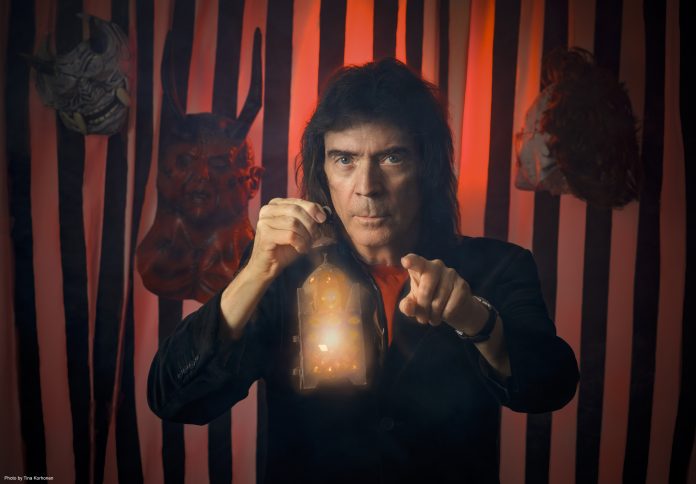HIT CHANNEL EXCLUSIVE INTERVIEW: February 2024. We had the great honour to talk with a legendary guitarist: Steve Hackett. He is a best known as a member of Genesis in the ‘70s, releasing with them classic albums such as “Foxtrot” (1972), “Selling England by the Pound” (1973) and “The Lamb Lies Down on Broadway” (1974). Since 1975 he has an acclaimed solo career. On 16th February he is releasing his new studio album “The Circus and the Nightwhale” via InsideOut Music. Read below the very interesting things he told us:
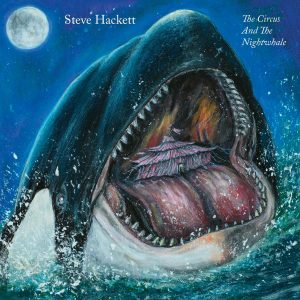 Would you like to give us some general information about the writing and recording process of “The Circus and the Nightwhale”?
Would you like to give us some general information about the writing and recording process of “The Circus and the Nightwhale”?
Yes, I can tell you that it’s a kind of companion piece to a book (ed: “A Genesis In My Bed” -2020) that I brought out, which I finished in lockdown, but this one is like an autobiography but in song, a kind of Odyssey. I guess, there is the influence of Homer who you would be familiar with, of course and all of the trials and tribulations; it’s very much in the style of one of those Odysseys. It’s 45 minutes long, it’s really a vinyl length album and indeed I started to get vinyl copies of it which it has the big whale’s mouth on the front swallowing the circus. It was made while I was traveling; to be honest, we were recording drums at soundchecks of concerts that I was doing in Europe and it was very interesting working that way, on the run. People were also sending in performances from all over the world, so although I’m here in the outskirts of London, people were sending performances from United States: Nick D’ Virgilio (ed: Spock’s Beard, Genesis) played drums on the opening track (ed: “People of the Smoke”). The bass parts were sent from Austria by our Swedish bass player, Jonas Reingold. Nad Sylvan, living in Sweden -I got another Swedish guy- sent vocals for the third track, “Taking You Down”.
We had Craig Blundell (ed: Steven Wilson, Frost*) on most of the drums on most of the tracks, recorded live in the halls that we were playing in. And there is one more drummer that I haven’t mentioned, Hugo Degenhardt, who I worked with many years ago, but I started working with him again because he is keen to work with me. He joined The Bootleg Beatles; that took him around the world several times, playing Beatle material, being Ringo. But he got tired of being Ringo in the end. He is a fantastic drummer as it happens. Amanda Lehmann (vocals) who sent stuff from Norfolk, which is in East Anglia, it is maybe 120 miles away from here in London. A guy called Malik Mansurov from Azerbaijan who plays the tar, which is a short scale string instrument playing Phrygian mode Eastern scales at the beginning of “Circus Inferno”. He’s playing that at the beginning. Then, our sax player Rob Townsend sent stuff from Denmark -he’s English but he lives in Denmark-, so he sent two solos from Denmark. My brother (ed: John Hackett -flute) who lives in Sheffield sent stuff from there.
So, there is all filesharing in one place and I have probably left off other people that are on the album: Roger King and Benedict Fenner who both played keyboards and both engineered, they mixed our sound live. Roger is the on board keyboard player live, but he is a very gifted engineer and arranger. The album was put together whilst I was on the run. I think everything that appears on the album moves very quickly from one thing to another to another to another… I wanted to keep the pace up with the album and we have two videos because “People of the Smoke” was released as a single and “Wherever You Are” was released as a single. “People of the Smoke”, there is a video from it which has gone viral, there are loads of people watching this on Youtube. So, it has put a lot of emphasis on the new album. The album sleeve looks a little bit like that (ed: he shows the CD version on the Zoom), but on the vinyl it’s much bigger. The whale’s mouth, you see, swallowing a circus.
“People of the Smoke”, the first single of the album is very cinematic. How is it thematically related to your childhood?
I grew up in London, which was referred to as The Smoke, so the smoke is a nickname for London, a sort of nom de plume for London. When I grew up it was just after the war and London was very much in ruins: We were playing on the rubble on the bombed sites of London when I first grew up and very quickly we moved to flats, apartments which were facing the Battersea Power Station, which is a famous building in rock ‘n’ roll because many years later…
 It is on Pink Floyd’s “Animals” (1977) album cover.
It is on Pink Floyd’s “Animals” (1977) album cover.
That’s right with the pink pig, but before there was a flying pink pig, I used to stare out of my bedroom window looking at this, which was the biggest building in Europe. So, I’ve tried to describe this musically with the era of steam trains and what radio sounded like at that time. There are some orchestral moments, some industrial moments, rock moments… Yes, I’m glad you said it’s cinematic; I’ve tried to make the album a cinematic roller-coaster of a ride throughout, because I wish I had the images in mind that are related to the various songs. That continues throughout the album, so it depends on what track you are referring to. You know, there is the more progressive sounding stuff, such us “Enter the Ring”, that’s really about my time with Genesis and it sounds more proggy: 12-string guitar, bass pedals, I sing harmonies with Amanda Lehmann on that. I think it’s a lovely sounding track because it starts with a thunderstorm that was going on when I was recording the track at home. There was a thunderstorm going, so we stuck a mic outside the window in this very room and we recorded the thunderstorm with the rain at the beginning to set the scene of that song. Then, you get “Get Me Out!” If one song was the celebration of Genesis, the second one is the idea of Genesis at its most claustrophobic for me. I loved my time in Genesis, I thought it was a great band, but they started to try and prevent me from doing solo stuff. It wasn’t allowed during my time in the band. Peter Gabriel left because of the same reason: He wanted to do solo stuff, it wasn’t allowed. But the next track which is “Get Me Out!” is all about being in that rock ‘n’ roll circus and wanting to get out; the claustrophobic feel. So, it’s the album as its most bluesy and grotesque and a shreddy guitar trying to do the things the guitarists do best, but you are probably not allowed to do when you are in a rock band and I had to be my own boss to do that. So, it’s some of that rock ‘n’ roll stuff.
The vocals -not the music- in “Enter the Ring” sound like Yes. Do you agree?
Well, funnily enough, I think it probably sounds more like Genesis, but then, it’s male and female voices together, three-part harmony, actually, a four-part because we stuck up the octaves. But I hadn’t really thought of that. I worked with Chris Squire (ed: Yes -bass) on a number of projects and we did an album called “Squackett” (2012) and I think vocally at times it sounded a bit like Yes. A bit like Yes, a bit like The Beatles, a bit like any of the harmony bands. When I work with Amanda doing harmonies, it sounds like those harmony bands men and women, that I like so much. Then, she also has this celestial voice she uses at the beginning of “Ghost Moon and Living Love”. Sometimes went these harmonies. There are times when Yes sound a little like The Beatles. There are times when each band gets to sound like another. But I don’t mind sounding like Yes, that’s fine. He asked me to join Yes, Chris Squire, at one point. So, I might have been a member of Yes. I was a member of Genesis and I could have been a member of Yes, as well, if I had said “yes” (laughs). But I was keen to revisit Genesis material with orchestra and with guests and do a kind of restitution of the Genesis material to do it live, as well. After all those years, to bring back music that was celebrated by John Lennon. He said that he liked early Genesis, he thought that Genesis were true sons of The Beatles. So, a bit like we were children of The Beatles and that’s fine. Hey, you know, I’m happy with that.
I love your playing in “Get Me Out”. Please tell us everything we should know about this amazing song.
It’s a song that was done in a bluesy style. I tracked up the guitars quite a lot in the beginning to make it sound like one big guitar. So, it’s got a kind of spooky sound to it. The song is all energy; lots of guitar. It was an excuse to play guitar, what can I tell you? I had to rant vocally, so I don’t know how I was trying to sound like, but I think I was trying to sound like Nina Simone or something.
 “Circus Inferno” is very addictive and has Mediterranean flavour in it. What inspired you to write “Circus Inferno”?
“Circus Inferno” is very addictive and has Mediterranean flavour in it. What inspired you to write “Circus Inferno”?
I was thinking of Middle Eastern music and Malik Mansurov, who I mentioned, he starts the track out. In the 1960’s British rock started to use influences of Indian and Egyptian stuff, as a scale called Phrygian. It’s a scale that is common to Egypt, India, also with Greek music, at times, you use the scale. So, this is something that I like very-very much. It’s a wonderful scale, I’ve used it a little bit with rock things in the past or sometimes with acoustic things. “Circus Inferno” is supposed to be frenzied. Again, it is the idea of musical claustrophobia where you are desperate for somebody, in my case, my wife, to come and save me from the perils of what I was going through in life at the time. So, it is a kind of frenzied love song.
Your acoustic playing in “White Dove” is unbelievable. Had you realised when you wrote it that it is one of the greatest songs of your career?
Well, I don’t know about that because I think that tremolo technique is so elusive. It’s the most difficult thing, I found, I ‘ve ever attempted to play on nylon guitar. A guy who was writing my stuff down, it’s like your name, his name is Theo Chen, Theodore Chen and his parents were from Hong Kong; so, he was looking a little bit like a Chinese Segovia, but rock, with long hair and he used to write my stuff down. One of the last sessions that I had with him, because unfortunately he passed away a few years ago, he wrote down that track and he was able to play it very fluently, much better than me. He was able to, because he had a really great tremolo technique and of course, I realised that it was very much like “Recuerdos de la Alhambra”, a famous piece which goes from minor to major, but he said: “It’s nice to have that as an alternative to that”. I wanted to explore the harmonies that are possible with the guitar. So, it’s very romantic and I think it gives the album a sort of peaceful resolution, right at the end, after you ‘ve been through all the angst and carnage with the rock instruments.
I watched the excellent “Foxtrot at 50 + Hackett Highlights: Live in Brighton” DVD. What makes “Foxtrot” album still relevant more than 50 years after its release date?
I think it was music that was designed to be played live and it was also very well-written by a young team where we were all trying our best to express ourselves. I think “Foxtrot” (1972) and “Selling England by the Pound” (1973), for me, were the golden period of Genesis; the golden period of working with Peter Gabriel and also having the interest from John Lennon, at that time. So, for me, it’s important. Maybe the reason it survived is because it is well-written and it is also based on story; “Supper’s Ready” is very conceptual, so half of the album is conceptual. Also, the writing is based on many different influences: “Watcher of the Skies” is science fiction with the use of the mellotron and the idea of the alien and all of that, a typically progressive track in many ways, with crescendo, very dramatic. We used to start out live shows with that and audiences used to like it very much. The bigger the place, the more ringy, if it was palais des sports, it sounded great, to make the world shake with that. A magnificent introduction that Tony Banks came up with. It’s a great use of mellotron. You could say that Tony was probably the best mellotron player ever, I would say. I was the one that got into the instrument; I was the one that said: “We need to get a mellotron”. So, you have science fiction, you have social commentary, you have romantic stuff, humourous stuff and it’s always the journey, the pan-genre, lots of styles, approach. The influence of classical music, of big band music, of jazz, many things that drive that album. Also, the use of the 12-string. 12-string guitar were very important to Genesis. So, at times you have three 12-string guitars, sometimes all playing the same part, but other times playing in harmony with each other and playing something similarly or complimentary to each other. So, it’s part of that very English pastoral sound.
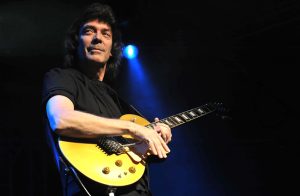 Are you proud that your first solo album “Voyage of the Acolyte” (1975) is considered a classic album?
Are you proud that your first solo album “Voyage of the Acolyte” (1975) is considered a classic album?
I’m very happy that it was very well-received at the time and seems to go through a re-appraisal now. I think it was analog, it was very done very quickly, so I would say the ideas were quite far-reaching. At times, I might listen to it and criticise my own timing or tuning, but time moves on and me make albums that are able to sound rather more perfect now because you can correct things in computer. It’s no longer a jump into the unknown, it’s different.
I’m addicted to “Tower Struck Down” from “Voyage of the Acolyte”. How did this incredible piece come about?
Well, there were two things: There is also a live version on “Foxtrot at 50”, the live album you mentioned with a re-arrangement to make it more classical really with marcato strings at the beginning before the band come in. But it really grew out of two separate riffs: I had one riff or an idea of chords and my brother John (flute), had the very angular “dum/ dum-dum dum-dum/ barabam/ babapam”. He had that and I think he was after something that sounded a little bit like Led Zeppelin, but I think it’s probably a little more like Led Zeppelin meets King Crimson perhaps, because you ‘ve got those tritones being utilized, certain harmonies, dissonant stuff.
How did it happen to have Steve Walsh (vocals) and Phil Ehart (drums) from Kansas and Richie Havens on “Please Don’t Touch!” (1978) album?
I was a huge fan of Richie Havens. We sometimes played on the same bill and then when Genesis became very famous and we were playing three nights at Earl’s Court to 20.000 people every night, we thought we should have a support act and we asked him and he said he would do it. I had met him backstage and congratulated him and he shook my hands for a very long time which was rather wonderful and I asked if he would like to come to my house and have dinner and he said: “Yes” and at the end of the evening he said: “We should do something together. We should work together” and I was thrilled that he said that. I started working on the track “Icarus Ascending”. I was meditating one day, I was doing Transcendental Meditation and the words of the song came into my head and I could hear him doing it and I phoned up him immediately. I told him that I had this experience and he said: “I can hear it already, it sounds great. Let’s do it. It seems very-very positive”. We recorded that one track, all in one evening, he did the vocals and he said: “Do you want to do other tunes?” and I said: “I ‘ve got a cassette here with a mellow one I was thinking that maybe might be right for you and it’s got a kind of Beatles flavour to it”, because I knew he was a Beatles fan and he recorded Beatle tracks very well.
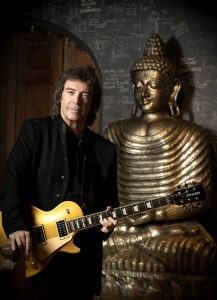 “Eleanor Rigby”.
“Eleanor Rigby”.
He said: “Why don’t we do this one, as well?” He did “She’s Leaving Home” as well, a very lovely version of “She’s Leaving Home”. So, I did a track called “How Can I?” with him and he really directed operations in the studio. He said: “You put down the guitar, first of all, and I play percussion” to which I replied: “Yes, sir!” (ed: he performs a military salute on Zoom) and then we put down maybe one or two guitars and he recorded the vocal to that. That’s all it needed and I added some stuff later on, some guitar synth. It sounded like a squeezebox but it was electronic, the guitar Roland GR-500 and it sounded like a little bit of homage to The Beatles that track and I was thrilled with that. And Steve Walsh: I met Kansas, they had “Carry On Wayward Son”, a big hit and “Dust In the Wind”. They were having hits, they were very mainstream in America but they loved British prog stuff. So, I met with them and they wanted to work with me and I wanted to work with them, so that’s how that association happened.
What was your reaction when Steven Wilson told you that “Please Don’t Touch!” is better than The Beatles’ “Sgt. Pepper” album?
I was thrilled that he liked it so much. For him, he said that as an 11-year old that was his “Sgt. Pepper”. So, Steven Wilson is obviously brilliant and I’ve worked with him on a couple of things. We are friends and I’m very happy for him that he has success on his own and also with Porcupine Tree. It’s very interesting to me that he is 17 years younger than me, see I’m in my 70s but he is 17 years younger. I think he likes music with detail, music that tells stories, so we are similar in that way.
I love your playing in “Firth of Fifth” (from “Selling England by the Pound” -1973). Would you like to tell us a few words about this amazing song?
Yeah. I think originally it was designed to be played on piano, that guitar melody and then it was piano and flute together playing in unison, but I just had to quote several things. I had a Hiwatt amp, a Les Paul guitar, a Colorsound fuzz box and I just got an Echo unit. It meant that I could sound like a studio musician but in the rehearsal room. So, the sound of all of this, I had a volume pedal and sustain, meant that I could play that melody with the whole band playing it. I like to think it revolutionised the song, as well as being a very big keyboard workout for Tony on piano and synth. The song comes alive in another sense with the instrumental melody that is so perfect for guitar. I think it’s one of Genesis’ best moments, I still play it live. I look forward to playing it live just about every concert that I do.
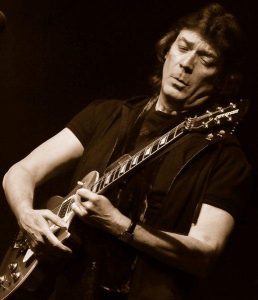 Is it flattering that your tapping technique influenced so many great musicians such as Eddie Van Halen and Alex Lifeson?
Is it flattering that your tapping technique influenced so many great musicians such as Eddie Van Halen and Alex Lifeson?
Yes, I think many fabulous guitarists have mentioned that I’ve been an influence on them with these techniques and also Brian May said this. So, it’s amazing to me. I never got to speak to Eddie Van Halen, but I think he was a marvelous guitarist, of course and Alex Lifeson, too, very much a driving force behind that band (ed: Rush). Yeah, but it’s wonderful to influence people such as Brian May. So, I’ ve influenced them, they ‘ve influenced me. That’s how it works.
A huge “THANK YOU” to Mr. Steve Hackett for his time. I should also thank Oliver Bergmann for his valuable help.
Main photo: Tina Korhonen
Official Steve Hackett website: https://www.hackettsongs.com/
Official Steve Hackett Facebook page: https://www.facebook.com/stevehackettofficial/
Official Steve Hackett Twitter page: https://twitter.com/HackettOfficial


